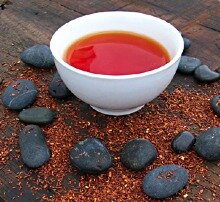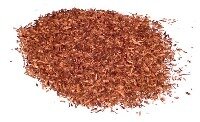
Before you think, "wait...yet ANOTHER tea I should be drinking?", stay with us -- this one is truly different.
And happens to be caffeine-free, unlike the other teas we've been discussing here on the BrainReady Health Blog. Yes, this is one you can drink anytime, including right before bed as a calming, settling way to wind down your day while fueling your brain and body with a truly mind-blowing array of nutritional elements that surprisingly few people still know about.
But that's about to change, as the word is finally getting out about Rooibos.
You may have already heard about "red tea", or "redbush tea", and perhaps even tried some as part of an herbal tea blend. But real, 100% organic Rooibos from South Africa what we're talking about here, and unlike the situation even just a few years ago, it's finally widely available in its pure native form if you look for it.
What is it? Rooibos (pronounced "roy-boss") tea is a South African/Afrikaans term which translates to "redbush", the name given to a bushy shrub that grows in the Cederberg province near Cape Town, South Africa. The redbush plant produces small yellow flowers and has needle-like leaves, which are collected, chopped and then bruised with special hammers, and then sun-dried and typically fermented. Since the fermentation turns the leaves a red-orange color, the sun-dried product is used to make the traditional red tea.

But an alternative, possibly even more healthful treatment does not include the fermentation or oxidation step -- and produces what is referred to as "green" Rooibos. This unfermented Rooibos has a yellowish color and a milder taste, while the red tea has a stronger taste described as sweet and fruity. While red Rooibos still packs the impressive load we'll discuss next, green Rooibos can be preferred because it contains an even higher level of antioxidants than the red, fermented variety. There is some debate in this area, however, as some studies have found that the fermentation process actually increases some other healthful elements despite decreasing antioxidant levels, so don't let lack of availability of the unfermented variety dissuade you.
Red or green, here come the health benefits: researchers at Iwate University in Japan recently found that Rooibos tea protects the brain & nervous system against a process known as "lipid peroxidation". This process occurs when damaging free radicals attack nervous tissue and brain cells, resulting in destruction of the protective outer layers of the brain cells, which leads to cell death. Over time, the damage accumulates and can lead to degenerative brain diseases such as Alzheimer's and Parkinson's disease.
The Japanese researchers gave Rooibos tea to a group of rats for a two-year period, and then examined their brains. Remarkably, they found that there was hardly any difference between the brains of the older rats treated with Rooibos tea, compared with the brains of new-born rats. By contrast, the brains of control rats that were not given Rooibos tea showed normal age-related changes, such as widespread destruction of brain tissue.
The scientists concluded that this amazing protection was due to the tea's ability to prevent the age-related build-up of damaged material in the brain.

Rooibos tea also contains a number of active ingredients and have been shown to treat a variety of other conditions from skin allergies, eczema, stress, sleep problems, stomach upset, indigestion and nervous tension. The plant's high mineral content (magnesium, calcium, zinc and iron), flavonoids, and other elements help fight inflammation and age-related degeneration. Further, scientists at the University of Milan, Italy have found that Rooibos tea contains one of the most powerful of all known flavonoids, called "aspalathin2", which helps to explain the strong brain-protective effects.
Rooibos tea may even help chronic diseases such as cancer and HIV:
South African scientists are now examining the effects of Rooibos tea against a variety of carcinogens (chemicals that cause cells to become cancerous), with preliminary results suggesting these harmful chemicals are rendered less damaging in the presence of Rooibos extract, and there is strong evidence that cancer risk may be reduced in people who consume Rooibos regularly. On the HIV front, researchers at the Okayama University in Japan have shown that Rooibos tea may also have positive effects against HIV, finding that Rooibos tea increases several immune chemicals such as interleukin-2, which can recognize and attempt to destroy the virus.
In addition to the high level of polyphenolic antioxidants, another reason that Rooibos is starting to take off as a health beverage is that, unlike many other teas, it is completely caffeine-free, low in tannins, and thus lacks the bitter astringent taste experienced with regular teas such as black and green teas. This low tannin content is great for those with digestive problems who have difficulty with tannin-rich regular teas or coffee. Tannins bind iron and therefore reduce the absorption of iron, which can be significant for those with low iron intake (some teas like black and peppermint tea may inhibit iron as much as 80 to 90 percent!).
Stomach-settling, relaxing effects: Rooibos possesses antispasmodic properties, and is commonly used in South Africa to treat babies that have colic and stomach cramps. South Africans also use the tea for calming intestinal spasms and digestive upsets in adults. When combined with the lack of caffeine and overall calming qualities, this makes Rooibos a wonderful after-meal and evening tea, with many people claiming that drinking Rooibos in the evening helps promote more restful, quality sleep and stress reduction.
Cancer and immune system protection: many of the flavonoids in Rooibos possess anti-mutagenic activity, with animal studies showing that Rooibos has potent anti-cancer and immune system protecting action.
Skin, liver, colon and more: Rooibos has also been shown to help inhibit skin tumors as well as help with skin infections, and as a result many in the skin care industry feel that Rooibos may be the new frontier for inclusion in skin care products. In South Africa, many apply Rooibos tea directly to the skin daily to help with everything from sun damage to age spots to infections and more.

Putting it all together: the vast array of health benefits alone should make you interested in trying Rooibos, but when combined with the lack of caffeine presence, calming qualities, great taste (fermented or not), and recent wider availability of this amazing herbal tea outside of South Africa, Rooibos may indeed be the most important new addition to your diet one could think of.
It has certainly been life-changing for us here at BrainReady, particularly as an afternoon and evening drink that we have felt to provide very real brain & body benefits as well as help with restful sleep (which in turn provides all-around health benefits). And what about contraindications or health risks? None, as far as anyone has found thus far, as further illustrated by the long tradition of consumption by babies and adults in often large daily quantities.
Where to find Rooibos: many specialty tea shops now carry Rooibos, usually the red fermented variety, as do many gourmet grocery stores. Green unfermented Rooibos can be found easily online (as can red Rooibos), so the key is to look for 100% pure, fresh, ideally organic Rooibos in loose-leaf form, not tea bags or as part of mixed blends, and unsweetened (you can sweeten it yourself if you must, but it tastes so good that you won't need to). You simply brew it in a tea pot with strainer like you would a black tea, with near-boiling water, steeping for at least 6 minutes for optimal concentration.
At BrainReady, we like to use a large amount of tea in order to produce a more concentrated, stronger brew (which also increases the amount of healthful properties), but you can brew to taste. It's also great iced with a slice of lemon, a perfect warm-weather drink that looks and tastes as if you're drinking some sort of tropical cocktail while providing the amazing array of health benefits that you'd normally only associate with a dark vitamin concoction. Fool your friends, then turn them on to Rooibos! ;)
However you drink it, red or green, hot or iced, morning or night, Rooibos may be one of the most significant additions to your diet -- and overall health. With brain/skin/stomach/antioxidant/immune benefits and more, no caffeine, and ready availability, there's little excuse not to give it a try.
(Here's a thought: just for a moment, imagine if everyone who drinks sodas were to switch to Rooibos instead; what would overall health and longevity look like? How would health care costs change? How would quality of life change? Discuss your Rooibos thoughts, questions and experiences below by clicking the 'Comments' link...)




